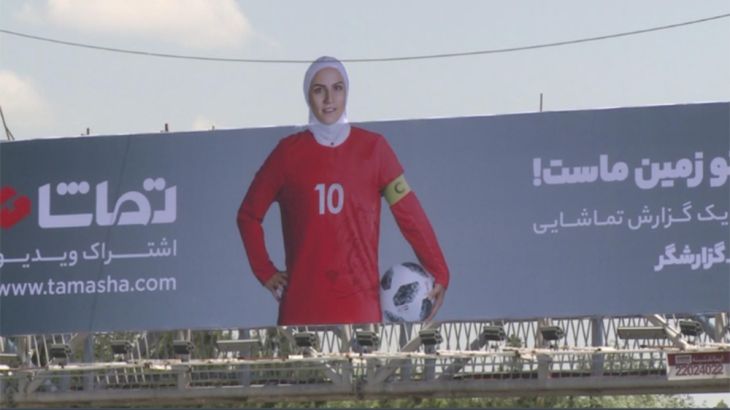Iran: Football World Cup, female fans and Saudi Arabian rivalry
Iran has managed to qualify for the World Cup, a win in itself for many, but political rivalries are obvious when fans watch the matches.

Follow Al Jazeera’s coverage of the World Cup 2018 here.
Tehran, Iran – In an Iranian home, four friends sat together to watch the opening game of World Cup 2018 between hosts Russia and Saudi Arabia.
Keep reading
list of 4 itemsRio Mayor on hosting World Cup, Olympics together: ‘DON’T!’
‘As important as Pele’: Brazil mourns football great Zagallo
Football ‘can bring joy’ to Lebanon amid Gaza war
It did not take long to see who they supported as, for many Iranian fans, regional political rivalries are extended to who they support on the pitch.
The room was happy to see their ally Russia thrash their rivals Saudi Arabia.
“This is political,” said Amir Doostmohammadi, a FIFA player agent and football expert based in the capital Tehran.
“If you ask Iranians and Syrians right now, they want Russia to win.”
It was difficult to keep up with the Persian commentary but the urgent and exciting delivery of the commentator is universal.
The Iranians in the room noticed him relishing in saying the word “zero” every time he mentioned the score.
“There is a kind of intersection between football and politics,” said Doostmohammadi.
“Remember, 20 years ago [the World Cup] was in France and it was Iran and the US in the same group. That match was quite political. When Iran won the game 2-1, the supreme leader had his own message. It was late at night, and he congratulated the team on this win.”
While it is difficult to untangle football from world affairs, Doostmohammadi said no side should bring up politics, religious differences or racial discrimination. Football offered an opportunity for players to wield the kind of soft power that can mend fences, he added.
After the 1998 game, US and Iran players exchanged shirts and shook hands, a kind of gesture leaders from both countries seem unwilling to make.
Iranian players had a difficult start to the World Cup – even before the tournament started. Nike refused to supply them with football boots, citing US sanctions.
A popular brand in Iran, original Nikes and knock-offs are widely available across the country. But that may change now.
“This is sport. It has nothing to do with politics,” said Doostmohammadi.
“Nike is perhaps a kind of popular brand. But I guess many people will have second thoughts about it.”
Meanwhile, Iran is where women still aren’t allowed to attend football games in stadiums. But there are signs of a change.
In Tehran’s north, there’s a billboard hanging from a footbridge. A 50-foot tall woman in football uniform stands holding a ball over a busy main street.
She has the captain’s armband.
![The billboard in Tehran [Al Jazeera]](/wp-content/uploads/2018/06/f91b800eddba489c853f1c9d2e587b9d_18.jpeg)
This image projects confidence and power. It’s an ad campaign, calling out to Iranian women to participate in a star-search style competition, to find the country’s next female football commentator.
It’s a sign that female football is becoming more mainstream.
“[Iranian] society views it positively now and football has become one of the most popular sports for women,” said Mina Rezaie, a youth football coach and former member of the women’s national under-19 indoor football team.
“I faced many challenges in my childhood but, I can tell you that if you make the effort, you can achieve whatever you want.”
Earlier this year, the national indoor football women’s team brought home the Asia Cup, encouraging more women to get their foot in the door.
Dress code
An issue that often comes up for these female athletes is the hijab – along with trousers and long-sleeved shirts – that the government requires them to wear.
But what is largely a western obsession, Rezaie said it has no real effect on an athlete’s ability to perform.
“It is difficult to play wearing a headscarf. It limits one’s flexibility,” said Rezaie.
“But it doesn’t bring about a major limitation. Our female team won the Asian title wearing hijab (a headscarf worn by many Muslim women who feel it is part of their religion) against powerful teams like Japan and China.
“If someone believes in something and if it is from the bottom of their heart, they would tolerate all difficulties to achieve their goal.”
Iranian sports have been dominated by male athletes for decades, but Doostmohammadi said social norms are changing.
“Islam is not really blocking women from such social events and occasions,” he said.
“From country to country, there might be some limitations and restrictions, such as dressing and head covering, but that is not the main point. The main point is that they are allowed to enter and allowed to [play] professionally.”
|
|